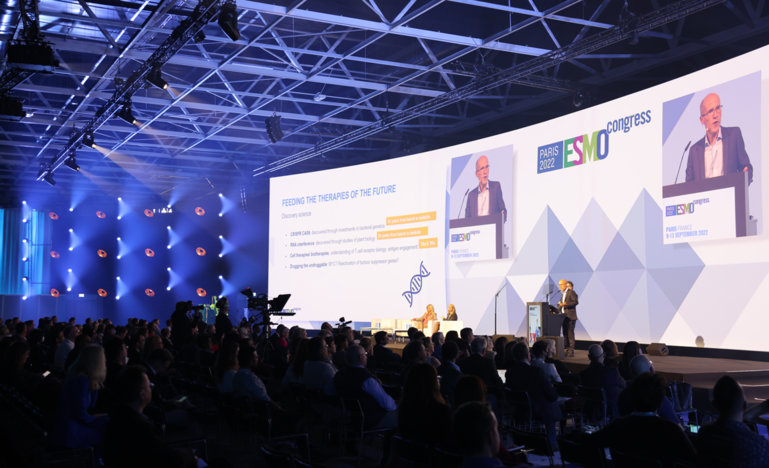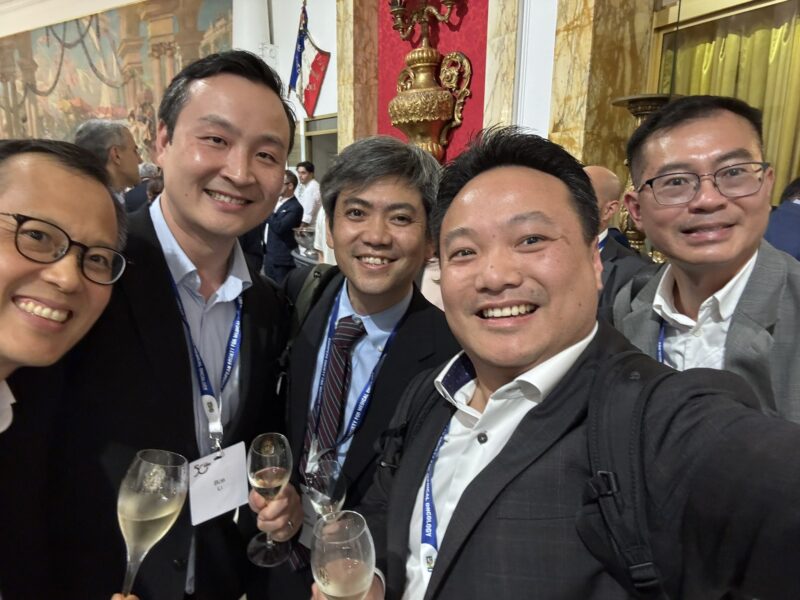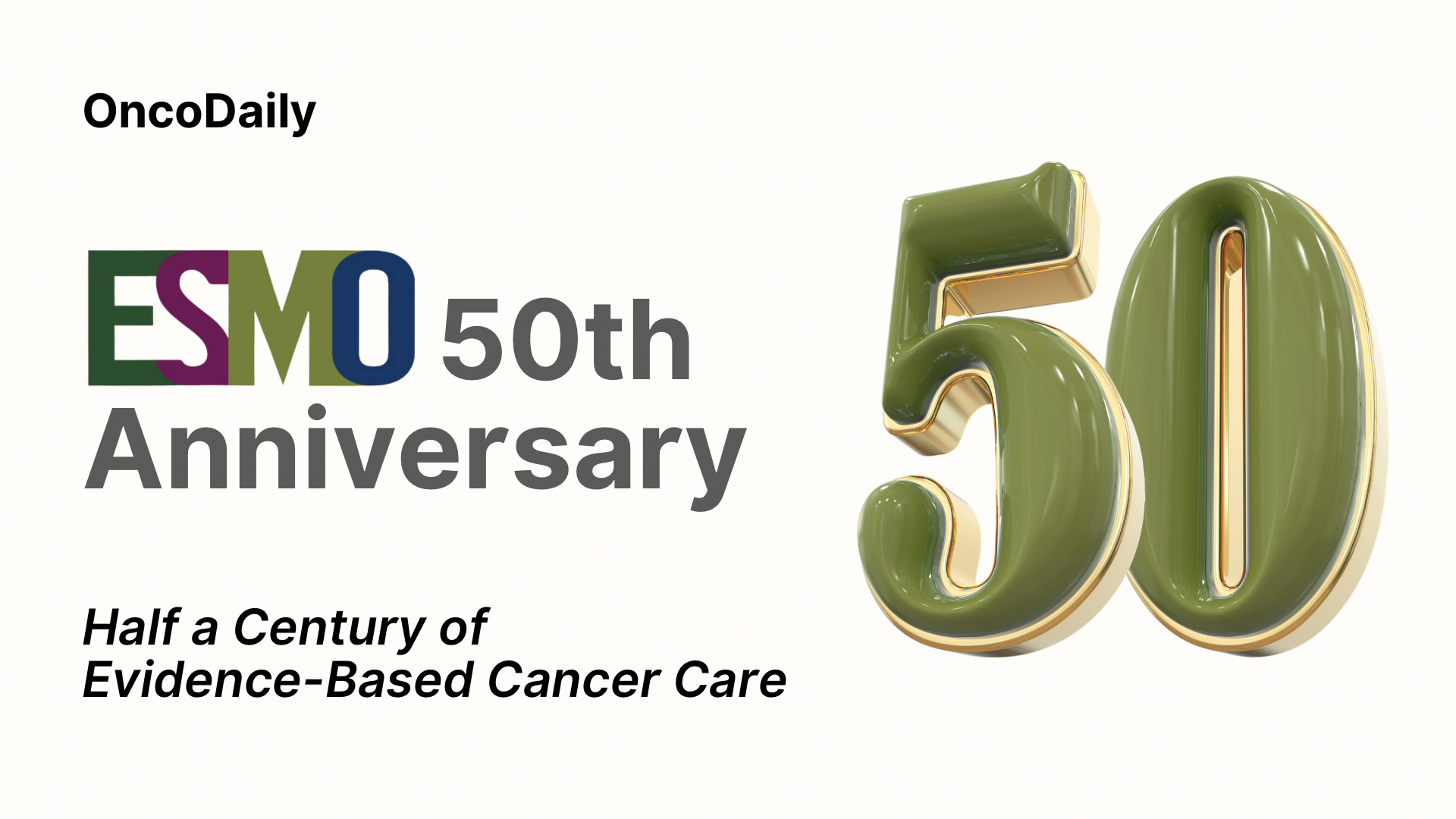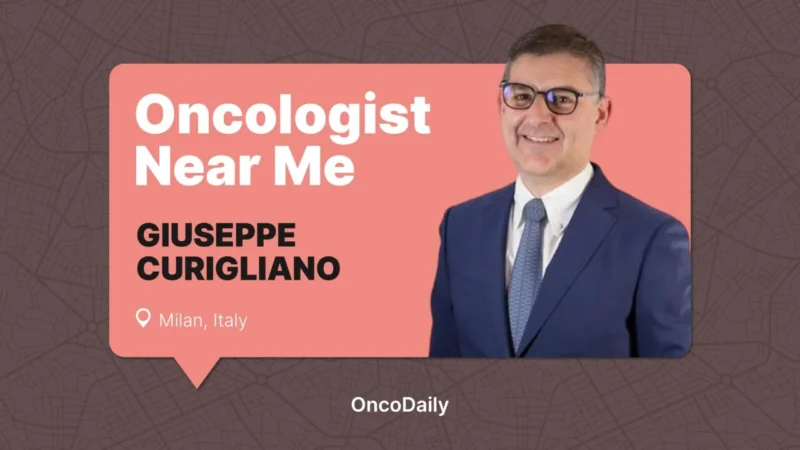ESMO 50th Anniversary was celebrated on June 27, 2025, marking a historic milestone in the evolution of global cancer care. Over five decades, the European Society for Medical Oncology has grown from a small collective of visionary clinicians into a worldwide force advancing oncology through education, research, and policy.
The anniversary not only honored ESMO’s legacy but also spotlighted its enduring commitment to evidence-based medicine, multidisciplinary collaboration, and equitable access to treatment. Through its leadership in setting clinical standards, supporting innovation, and uniting the international oncology community, ESMO has fundamentally shaped the way cancer is understood, treated, and managed today.
A History of Impact
Since its inception in 1975, ESMO has been instrumental in advancing oncology from a nascent discipline into a mature, globally coordinated specialty. At a time when cancer treatment approaches varied widely across European countries, ESMO’s founders envisioned a society that would bridge gaps between practitioners, foster collaborative research, and set common standards of care.
Over the years, ESMO has grown into an international organization with over 40,000 members in nearly 180 countries. Its annual Congress has evolved into one of the world’s largest oncology meetings, attracting leading researchers, clinicians, and policy makers. ESMO’s impact extends beyond Europe, influencing global oncology through guideline development, education, and advocacy.
A hallmark of ESMO’s influence has been its commitment to evidence-based medicine. By producing rigorously developed clinical practice guidelines, the society has promoted consistent, high-quality care while addressing disparities. The launch of the Annals of Oncology journal in 1990 further solidified ESMO’s role in disseminating groundbreaking research.
Moreover, ESMO’s dedication to education and career development through preceptorships, fellowships, and certification programs has helped train generations of oncologists worldwide, ensuring the continued evolution of cancer care. During recent challenges such as the COVID-19 pandemic, ESMO demonstrated resilience and adaptability by issuing timely guidance and expanding digital education platforms.
The society’s innovation continues with the ESMO Magnitude of Clinical Benefit Scale (MCBS), a unique tool that evaluates the real-world value of cancer therapies and supports informed health policy decisions. Alongside initiatives addressing diversity, inclusion, and equitable access, ESMO remains a leading force shaping oncology today and for the future.
Annals of Oncology: A Platform for Scientific Excellence
Since its launch in 1990, Annals of Oncology has served as ESMO’s flagship scientific journal, publishing original research, clinical trial results, translational studies, reviews, and policy analyses. The journal’s global reach and high scientific standards have made it a respected platform for disseminating influential oncology discoveries.
Annals of Oncology has fostered international collaboration by including authors and editorial board members from across the globe. It has played a central role in accelerating the translation of research into clinical practice, thereby directly benefiting patients.
In 2015, ESMO further expanded its publication portfolio by launching ESMO Open, an open-access journal aimed at broadening access to oncology research and education worldwide, especially in low- and middle-income countries.
Clinical Practice Guidelines: Foundations of Standardised Care
One of ESMO’s most impactful achievements has been the development of its Clinical Practice Guidelines (CPGs), which provide comprehensive, evidence-based recommendations for diagnosis, staging, treatment, and follow-up across a wide range of malignancies.
These guidelines are developed through a rigorous process involving systematic literature reviews and multidisciplinary expert consensus to ensure scientific accuracy and clinical relevance. Updated regularly to incorporate emerging data and new therapies, ESMO guidelines are widely adopted by oncology professionals worldwide, forming a critical foundation for standardized care.
By harmonizing treatment approaches, ESMO’s CPGs help reduce unwarranted variations in care and contribute to improved patient outcomes. They are particularly valuable in supporting clinicians in resource-limited settings by offering clear, practical guidance tailored to different healthcare contexts.
50 Years of Research Impact: ESMO’s Role in Transforming Cancer Care
Here are practice-changing research initiatives and studies led or significantly shaped by ESMO over the years:
1.Prostate Cancer: LATITUDE & PEACE‑1 trials
Under the leadership of Prof. Karim Fizazi, ESMO Congress 2022 showcased pivotal trials in metastatic castration-sensitive prostate cancer:
- LATITUDE (2017): Demonstrated that adding abiraterone to standard androgen-deprivation therapy significantly extends both overall and progression‑free survival
- PEACE‑1 (2022): Introduced a triplet therapy—ADT, docetaxel, and abiraterone—that further improved survival and radiographic outcomes in de novo metastatic patients
These studies have reshaped frontline prostate cancer treatment by establishing intensive combination therapy earlier in the care pathway.
2.Precision Oncology: ROME & DLCT trials (ESMO Congress 2024)
At ESMO Congress 2024, results from Drug Rediscovery Protocol–like Clinical Trials (DLCTs), including the ROME trial, clued in on broad genomic profiling:
- Compared to standard care, targeted therapies matched to patients’ actionable mutations significantly improved response rate (17% vs 9.5%) and progression-free survival (3.7 vs 2.8 months)These findings support embedding comprehensive genomic profiling into standard oncology practice.
3.Tumor-Agnostic Targeting: ADC & FGFR trials
ESMO Daily Reporter highlighted advances in tumor-agnostic approaches:
- DESTINY-PanTumor-02: Trastuzumab deruxtecan showed a 61.3% ORR and 22.1-month duration of response in high-HER2-expressing tumors of various origins
- RAGNAR trial: Erdafitinib achieved a 29.5% response rate (including complete responses) across FGFR‑altered solid tumors—marking it as the largest FGFR tumor-agnostic trial to date
4.Immuno-oncology in Neoadjuvant Therapy
ESMO has driven transformation in early-stage cancer treatment:
- The NICHE‑2 trial in colon cancer used neoadjuvant nivolumab + ipilimumab in dMMR patients—100% responded, and no recurrences were observed at 26 months
- The NADINA phase III study in stage III melanoma showed neoadjuvant dual checkpoint blockade outperformed standard adjuvant therapy, reducing treatment burden for many

Awards and Fellowships: Recognizing and Supporting Excellence
ESMO’s commitment to fostering excellence is reflected in its extensive awards and fellowship programs. Since 1989, the society has awarded over 600 fellowships to early-career oncologists, supporting clinical and translational research, as well as specialized training.
These fellowships provide recipients with invaluable opportunities for mentorship, hands-on experience in leading cancer centers, and international networking. In addition to fellowships, ESMO confers awards recognizing outstanding scientific contributions, leadership, and innovation within the oncology community.
Through these initiatives, ESMO nurtures the next generation of oncology leaders, encouraging the development of new talents and supporting the career progression of professionals committed to advancing cancer care.
Career Development: Supporting Oncologists at Every Stage
ESMO places a strong emphasis on career development through structured educational programs and certification pathways. The ESMO Oncology Fellowship Programme offers diverse training opportunities, ranging from clinical rotations to research internships.
The society also supports young oncologists through the Young Oncologists Committee (YOC), which provides mentorship, networking, and leadership development tailored to early-career professionals. In addition, ESMO administers the Medical Oncology Certification Exam, which is recognized internationally as a benchmark of clinical competence.
Furthermore, continuous professional development is encouraged through ESMO’s online learning platforms, preceptorships, and the ESMO Academy, which provide accessible, accredited education that aligns with evolving standards of care.
Mission and Vision: Driving Global Progress in Oncology
ESMO’s mission is to improve cancer care by advancing scientific knowledge, promoting multidisciplinary collaboration, and fostering education and training worldwide. It envisions a world where every patient has access to optimal, evidence-based cancer treatment delivered by well-trained professionals.
To achieve this, ESMO advocates for equitable access to care and participates actively in shaping health policy. The society works closely with governmental and non-governmental organizations to influence regulatory decisions, reimbursement policies, and public health strategies, always emphasizing patient-centered care.
Diversity, inclusion, and sustainability are embedded within ESMO’s vision, reflected in programs such as Women for Oncology and the ESMO Global Cancer Coalition, which strive to broaden participation and reduce disparities across the oncology community.
Young Oncologists & ESMO Grant Support
The Young Oncologists Committee (YOC) champions early‑career ESMO members (under age 40), offering mentorship, leadership opportunities, and tailored learning events such as YOC Masterclasses and virtual sessions.
- Travel Grants for ESMO meetings: €1,000 per recipient
- Educational Grants: e.g., Clinical Unit Visit fellowships (€6,000 for 8 weeks); Palliative Care Observerships (€2,500–€3,000)
- Research Fellowships: Annual grant of €60,000 for 1‑year clinical/translational projects or José Baselga Clinician Scientist fellowships of €200,000 over 3 years
- Digital & Computational Pathology Fellowships: €200,000 over 2 years
ESMO President-Elect, Professor Giuseppe Curigliano, who currently serves as President-Elect of the European Society for Medical Oncology (ESMO) and Editor-in-Chief of ESMO Open, the official journal of the society — read here
Here are several recent posts from X that have been widely shared and discussed by oncologists
“Congrats ESMO for your 50th birthday! A real pleasure to be part of this celebration with international oncology colleagues! Ben Solomon, Vivek Subbiah and many others!”

“Super excited to celebrate my birthday with ESMO family and friends at the ESMO 50th birthday in Nice on June 27! Thank you all for the pleasant surprise”

Important Links:
Written by Nare Hovhannisyan, MD

